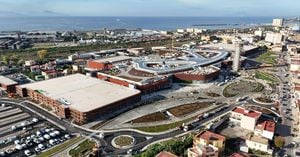The Constitutional Court of South Korea officially commenced the impeachment trial of President Yoon Suk-yeol on December 14, 2024, following the National Assembly's approval of the impeachment motion earlier the same day. This move marks the third time South Korea has held such proceedings against its president, reflecting the nation’s long-standing political contention.
The legislative vote garnered significant attention, concluding with 204 lawmakers backing the motion versus 85 opposing it. Jeong Cheong-rae, Chairperson of the Legislative Judicial Committee, confirmed, "The Constitutional Court started the impeachment trial after the National Assembly passed the motion." This contentious decision has propelled Prime Minister Han Duck-soo to act as the president's interim authority during the trial.
According to constitutional law, immediate ramifications of the impeachment include the suspension of President Yoon's powers until the court reaches its verdict, which could take up to 180 days. The court faces a serious responsibility, as highlighted by the following statement: "The court will have to make its ruling within 180 days of the start of the trial," per court regulations.
Historical precedence plays a pivotal role in how this trial will be perceived. For reference, the cases involving former presidents Roh Moo-hyun and Park Geun-hye unfolded within 63 days and 91 days, respectively, fostering public discourse on the governing system's effectiveness and the repercussions of presidential misconduct. "Should the court find justification for the impeachment, it will lead to the president's removal and necessitate elections within 60 days," stated legal experts. This timeline has significant political ramifications as South Korea moves through turbulent electoral phases.
Political analysts have noted the uncertainty looming over the political environment following this unprecedented motion. They argued, "The political atmosphere remains uncertain following the passage of the impeachment motion," hinting at potential shifts as the process evolves.
One significant challenge for the Constitutional Court is the notable vacancy among judges. Currently, three seats are unfilled, restricting the court's number to function effectively under the constitutional requirements, which dictate the participation of at least seven judges for major rulings. This is particularly concerning as the court has the authority to make decisions about the validity of presidential conduct and oversee whether the charges hold merit under scrutiny.
This lack of full representation raises questions about the legitimacy of any rulings made from this point forward. Given the constitutional definition, the court will need at least six judge votes to uphold the impeachment. Observers have pointed out the potential complications: "The court may be forced to expedite the process of appointing new judges, as the current six-member structure creates uncertainty surrounding decision legitimacy."
Nevertheless, the ruling does come with its procedural intricacies. The Constitutional Court must work diligently within the 180-day time frame, as mentioned earlier. This timeframe includes assembling documentation and providing the necessary legal oversight as it navigates through the charges leveled against President Yoon. Notably, the court handled this process efficiently during past impeachment hearings, which have shaped public perception substantially.
Experts believe the trial's outcome will undoubtedly redefine South Korea's political framework. Major consequences arise not only from the impending changes within the court but also from the potential for electoral upheaval. If Yoon's removal proceeds as expected, electoral mechanics must follow swiftly, placing additional pressure on lawmakers and potential candidates leading to the next elections.
Throughout its history, South Korea's political strategy has heavily relied on its judicial systems’ integrity. This current scenario poses significant questions about the extent of judicial reach over executive actions and whether existing mechanisms can withstand such political turbulence.
Consequently, the political temperature is set to rise as the court deliberates over the coming months. With government, court, and opposition dynamics shifting continuously, every decision made will echo throughout the nation, leaving political analysts and citizens alike watchful over the future of the presidency and broader governance.
Whether these proceedings culminate with the upholding or rejection of Yoon’s impeachment remains to be seen, as does the broader impact on South Korean democracy, governance, and public trust.



